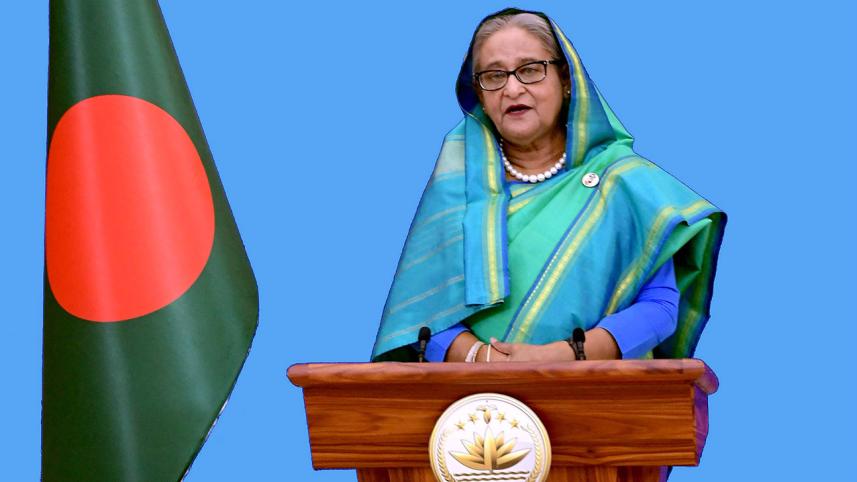Covid-19: PM seeks global action to address liquidity crisis, debt burdens

Prime Minister Sheikh Hasina yesterday underscored the need for ambitious and concentrated global action plans to address the liquidity crisis and sovereign debt burdens now and during the post-Covid-19 era.
The prime minister said this in a video message delivered at the 'Financing for Development in the Era of Covid-19 and Beyond Initiative: International Debt Architecture and Liquidity'.
Canadian Prime Minister Justin Trudeau, Jamaican Prime Minister Andrew Holness and UN Secretary-General Antonio Guterres convened the meeting of world leaders to urge the international community to take additional and urgent action to ensure a robust economic recovery.
The high-level virtual meeting aims to underscore the urgency of the need for more audacious and concrete action to provide liquidity and address debt vulnerability.
Moderated by BBC news anchor Laura Trevelyan, the meeting of heads of state and government featured opening remarks by Antonio Guterres, Justin Trudeau and Andrew Holness.
Sheikh Hasina said strong leadership is needed from the G7, G20 and OECD (Organisation for Economic Co-operation and Development) countries.
She said developed countries, MDBs (multilateral development banks) and IFIs (international financial institutions) should scale up liquidity for vulnerable countries, such as large and new "Special Drawing Rights" allocation.
"International debt architecture also needs to be revisited for suitable reform," she said.
The prime minister also put emphasis on fulfilling the 0.7% ODA commitment of the developed countries. "They should also expand fiscal stimulus, concessional finance and debt relief measures for vulnerable economies."
Finally, the PM said there must be new international support measures for the graduating least developed countries, at least till 2030, commensurate with the sustainable development goals.
She said more than one year has elapsed since the outbreak of Covid-19 and the world is still struggling to overcome the socioeconomic challenges posed by it. "The UN has estimated that the global economy is expected to lose nearly 8.5 trillion dollars in output over the next two years."
Talking about Bangladesh, she said the government adopted comprehensive plans to minimise the impact of the pandemic on the lives and livelihoods of people.
"We immediately rolled out a stimulus package worth more than 1.24 trillion taka, equivalent to USD 14.58 billion, which is around 4.44% of our GDP."
Hasina mentioned that the government has provided adequate liquidity and loanable funds in the market to ensure uninterrupted business operation. "We undertook supportive policy interventions to minimise shocks on foreign exchange market, foreign trade and finance, remittances, external borrowing etc."
Despite the pandemic, the prime minister said Bangladesh has still been comfortably servicing its debt with the reputation of 'non-defaulting party' because of the prudent borrowing policy of the government.
 For all latest news, follow The Daily Star's Google News channel.
For all latest news, follow The Daily Star's Google News channel.